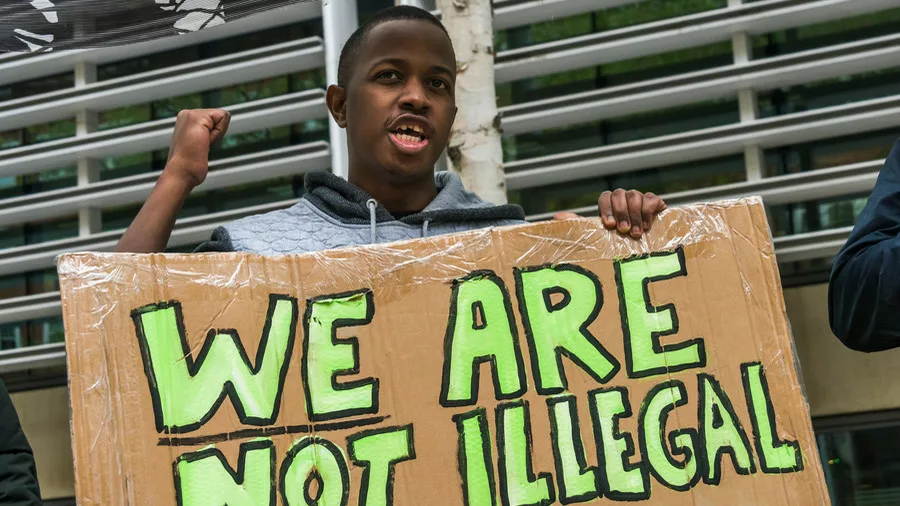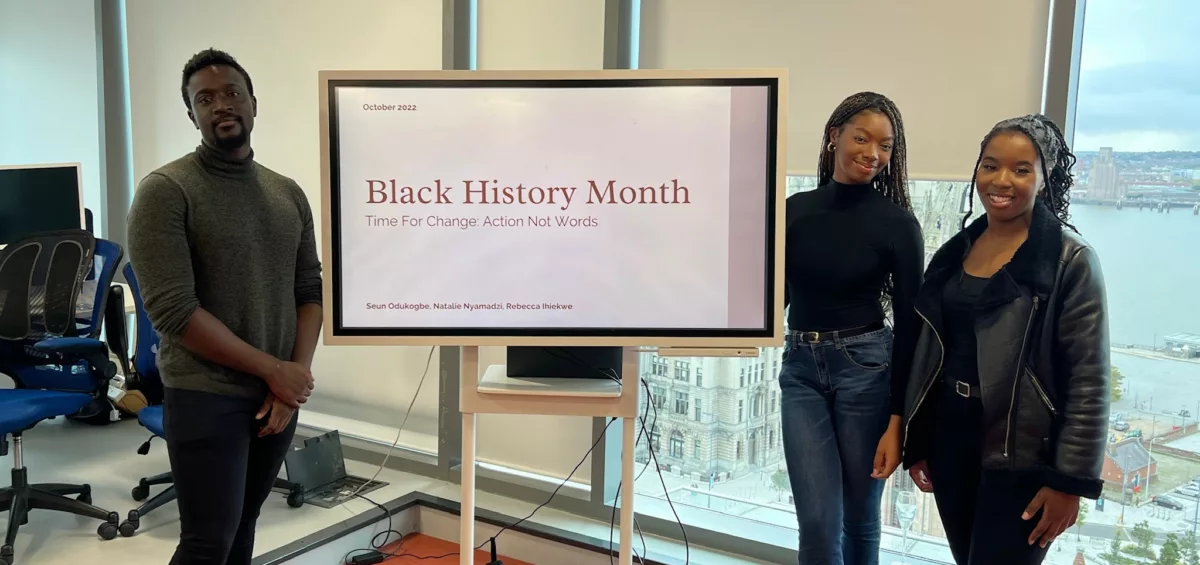To celebrate Black History Month, Seun, Natalie and Rebecca delivered a talk discussing the underrepresentation of Black people within the legal sector.
With the theme of the year being ‘Time For Change: Action Not Words’, the team provided actions that we can take both as a business and as individuals to ensure that diversity and inclusion is prioritised in an effective and authentic way.
Why is Black History Month Celebrated?
Black History Month is celebrated every year throughout the month of October. It is held as a way of remembering important people and events that have occurred throughout Black British history.
Black people are often given the double burden of experiencing racism and then being expected to fix it. Whilst Black History Month is a time to reflect on the past, the team emphasised that in order to instil positive change in the future, we need action, not words.
At CEL Solicitors, we strive to positively contribute to the workplace and wider society. Therefore, we wanted to give our Black employees the platform to express themselves freely so that we can become active allies in the fight against discrimination.
Companies which are diverse in gender, ethnicity and culture are now more likely than ever to outperform less diverse companies. However, research has also shown that people of colour must manage their careers a lot more strategically than their white peers before gaining a promotion.
Despite the clear benefits of inclusive leadership, many businesses failing to prioritise diversity and inclusion. To address this disparity, it is important to look back at history.
World War I & II
In the First and Second Word War, soldiers from Africa and the Caribbean fought for Britain, with many of them being forcibly recruited to protect Britain’s colonies in Africa and further afield.
At the time, Britain paid its soldiers according to their rank, length of service, and ethnicity. This racial hierarchy led to the systematic discrimination of African personnel as they were paid up to a third less than their White counterparts of the same rank. Even White soldiers living in African colonies would receive more than African soldiers. We can see that for over a century, Black people have struggled with systematic racism.
Once the Second World War ended, the British government further denied African soldiers’ equal treatment. They were forced to return home to poverty with little compensation or recognition for their service to Britain. The misconception of who fought for Britain during the First and Second World War has led to the complete erasure of Black and Brown servicemen and women and has been a catalyst for further systematic oppression.
The Windrush Generation
Following on from the Second World War, there was a massive shortage of labour in Britain. Therefore, people from Africa and the Caribbean were asked to come and help rebuild the economy.
Referred to as the Windrush Generation, these Caribbean migrants were promised great opportunities and job prospects. Many felt they would be welcomed home to the ‘Mother Country’ to which they assumed belonging. Instead, they were forced to live in the poorest areas, received hostility and racism, and struggled immensely to find employment.

The Windrush Scandal
When the Windrush generation arrived in England, the Caribbean was a part of the British commonwealth, meaning that those who came were granted British citizenship and permanent residency. They neither needed nor were given any documentation upon entry.
In 2012 the British government introduced the Hostile Environment policy. The aim of the policy was to make staying in the UK as difficult as possible for people without indefinite leave to remain (permission to permanently live and work in the UK).
“The aim is to create, here in Britain, a really hostile environment for illegal immigrants.” – Home Secretary, Theresa May, 2012
Because many Caribbean’s arrived as children, many of them lacked the documentation to prove their right to remain in the UK. The Home Office also destroyed thousands of these records.
The government harshly and falsely deemed the Windrush Generation as ‘illegal immigrants’. As a result, they began to lose access to housing, healthcare, bank accounts and driving licenses. Worst cases included people being placed in immigration detention, restricted from travelling abroad, homelessness, and deportation.
It is clear throughout history and present day that black people have made huge contributions to Britain and it’s economic growth, not only in the post-war period, but also across decades of continuous employment.
This Windrush Scandal is yet another example of how easily the contributions of Black people in British society can be so easily omitted from history.
The Underrepresentation of Black People in the Legal Sector
Black employees have always struggled for equality at work. Even in the 1950s and 1960s, a colour bar existed in employment, meaning that discrimination based on race was completely lawful.
Since then, there has been legislation put in place to protect ethnic minority employees such as the Race Relations Act 1968 which made racial discrimination unlawful in public places. Though, are these legal protections fully effective? When we look at certain professions today such as Law, academia, politics and the corporate sector, Black people remain highly underrepresented and undervalued.
Of the entire UK legal workforce (including lawyers, solicitors, partners, HR, IT, marketing, and so on), Black people make up only 3 per cent of it. As a business, it is vital for us to advocate for inclusion, empower our diverse employees, and thus work towards increasing that 3 per cent figure.
Seun, Natalie, and Rebecca outlined some actions that we can take as a business and as individuals:
- Foster an inclusive and open-minded culture and engage in open dialogue. We don’t always have the answers, but if we are open-minded, we can address certain issues. Only then can difficult conversations shift from uncertainty to transparency.
- Provide Equality, Diversity, and Inclusion training
- Showcase diverse talent without resorting to tokenism. This will help potential future employees feel empowered throughout the recruitment process.
- Provide ethnic minority employees a platform to express themselves and discuss their authentic lived experiences.
- Recognise our own unconscious bias. We all harbour prejudices. Many that are held in our subconscious can unintentionally influence how we see each other, act toward one another and how we enable certain behaviours and attitudes. Once we recognise this, we can dismantle our biases and work towards equality.
- Celebrate and embrace each other’s differences. We shouldn’t be colourblind – there are certain barriers faced by black and ethnic minority people which should be acknowledged. We’re all extremely unique. Our backgrounds influence us all in different ways and this should be celebrated.
- Be an ally. Listen to your peers. Advocate for equality, diversity, and inclusion where possible.
- Research. Education is key and it’s always good to stay informed. What steps can you take to become an active ally?
Commenting on the presentation, Owner and Director, Jessica Hampson said:
“As the owner of CEL Solicitors with a people before profits firm; people meaning our staff, clients, and community, it was vitally important to celebrate Black History Month because it represents our people.
For me, it was an opportunity to start the conversation within CEL Solicitors, reflect on what Black History Month means, and to open the dialogue about the changes we want to see in the future and most significantly, how we can support those changes.
This year’s theme was Time For Change: Action Not Words. Rebecca, Seun and Natalie stood in front of their peers with their hearts on their sleeves and so eloquently shared their own observations, struggles and accomplishments. I will be forever grateful to them as it has made the firm a better, more understanding and open place.”













